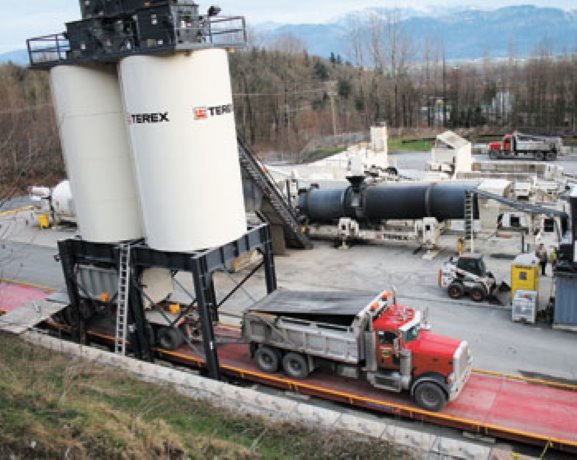The $6.6 million acquisition of the asphalt plant is a much needed asset for a 16-year-old construction company that has set its sights on larger municipal and government highway contracts.
The $6.6 million acquisition of the asphalt plant is a much needed asset for a 16-year-old construction company that has set its sights on larger municipal and government highway contracts.
KeyWest Asphalt Ltd. of Surrey acquired SuperWest Asphalt Ltd. of Abbotsford.
The company will be competing against, what KeyWest president Ricky Dhatt calls, the Big Five paving companies that now dominate the market.
The plant will provide KeyWest with greater control over pricing, supply and the delivery of asphalt when bidding contracts, said Dhatt, adding that crews would be able to work on a Sunday if necessary.
Currently, he said, most asphalt plants are closed on Sundays and a premium – as much as $2,500 for four hours of operation – is paid if a paving company needs materials.
Dhatt is also hoping the acquisition will propel KeyWest into the ranks of the Big Five paving companies and make it the Big Six.
He would also settle for replacing one of the companies.
Currently, smaller and intermediate sized paving companies opt for a strategic alliance with one of the major asphalt plants and, in exchange for a long-term commitment, the supplier provides a pricing incentive.
It is an arrangement that works well for both the large and not-so-large companies, as their business profiles differ and are mainly non-competing.
However, when KeyWest started in 1996 with a few pieces of rolling stock, he had a definite eye on growth and has steadily been adding equipment and workers.
“In 2007-2008 we started to bid on some municipal contracts,” said Dhatt, which adding to the traditional business of doing lanes, driveways, tennis courts and commercial parking area.
But, he was in a tough position as the major suppliers were also bidding on these government contracts.
It was not a comfortable position for Dhatt, who felt he didn’t have the independence needed to bring in the best possible quote when bidding those contracts or the freedom to schedule the work so that it was the most cost-effective.
Earlier this year, he began looking for his own asphalt production facility and found SuperWest on Sumas First Nation’s land on Sumas Mountain.
The band built Alpha Asphalt to give Abbotsford’s Superior Asphalt Paving a guaranteed supply for its paving business.
Dhatt cut a deal that saw the plant become the property of KeyWest, but remain on band land under a long-term lease.
The deal was done in March.
“It is brand new state of the art technology,” he said.
Alpha Asphalt had installed a Terex E225P super portable counterflow drum mix plant obtained from Terex Roadbuilding.
Senior estimator Steven O’Neill said it’s a good opportunity, as it is becoming difficult for paving companies to start an asphalt plant within Metro Vancouver because of growing concerns over air quality and emissions.
Yet, the plant is equipped with the latest in emissions control equipment and in 2010 when opened, was well below the ceiling of emissions.
The asphalt plant, which can be moved for larger jobs and has a per hour production capacity of 225 tons per hour, is also the newest facility in the Lower Mainland.
It benefits KeyWest because the company not only has paving crews and equipment, but its own trucking division, which is an important asset when asphalt must be delivered within a specific temperature range.
He is hoping to take integration even further in 2012 with the addition of an aggregate quarry.
“We are working on it,” he said.
Dhatt said he believes that such integration leads to more competitive bids.
Today, the company has 100 employees and 200 pieces of equipment – the latest addition is the German-built Wirtgen cold-milling machine.
“Most municipalities require milling of the existing road prior to paving,” explained Bill Holtz, director of business development for KeyWest.
With the addition of the machine, he said, KeyWest now has the capacity to mill 35 to 75 mm of material.
The milled material can be recycled as more municipalities are allowing a percentage of reused material in the asphalt mix.
“We have had success in bidding contracts despite not having our own plant,” said O’Neill.
But now, the company isn’t dependent on the major players for asphalt and can more confidently nail down prices.
“We are not getting an email next week saying that the price of asphalt has just (been raised) up $2 a ton,” he said.











Recent Comments
comments for this post are closed